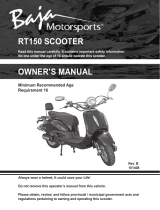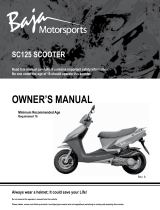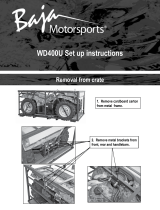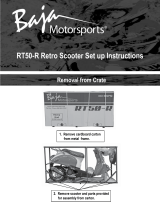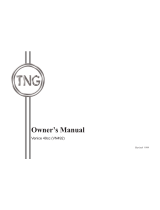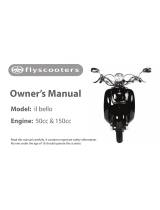Page is loading ...

Always wear a helmet; It could save your Life!
Do not remove this operator’s manual from this vehicle.
Please obtain, review, and follow provincial / municipal government acts and regulations
pertaining to owning and operating this scooter.
Minimum Recommended Age
Requirement 16
Rev. G
030509
RT50-R Retro SCOOTER
Read this manual carefully. It contains important safety information.
No one under the age of 16 should operate this scooter.
OWNER’S MANUAL

II
Congratulations on your purchase of the BAJA INC. RT50-R Retro
Scooter.
Your Scooter is warranted to be free of manufacturing defects in
material and workmanship for a period of 90 days from the date of
purchase. During the warranty period BAJA INC. will at its option,
repair, provide replacement parts or replace your BAJA INC. 50cc
Scooter at no charge. This warranty does not cover normal wear
items or damage caused by neglect or misuse of the product.
Engine Warranty – 90 days
Frame Warranty – 90 days
Warranty is void if:
Frame is bent or broken due to abuse
Wheels are bent or broken
Fender bent or broken due to abuse
Any sign of impact, accident, jumping, spin-outs or roll over.
BAJA INC. is not liable for any damage claim or liability claim
person or otherwise resulting from the operation of this product in
any way.
Should you experience a problem with your vehicle, please call the Baja
INC. customer service line toll free at 1-888-863-2252 between the hours of
7am and 5pm Monday through Friday MST (Mountain Standard Time). MDT
(Mountain Daylight Time) during daylight saving time. You will be instructed
how to proceed.
A COPY OF THE SALES RECEIPT IS REQUIRED.

III
This manual should be considered as a permanent part of the
vehicle and should remain with the vehicle when resold or
otherwise transferred to a new user or operator. The manual
contains important safety information and instructions which
should be read carefully before operating the vehicle. All
operators should obtain, review, and follow provincial and
municipal government acts and regulations pertaining to owning
and operating an on-road vehicle. Children under the age of 16
should never operate this vehicle.
WARNING
!
It is the operators responsibility to know and obey all applicable
local, state and federal laws at all times while operating this
vehicle including but not limited to trafc safety, vehicle
registration, emissions, and noise.
The exhaust from this product contains chemicals known to
the State of California to cause cancer, birth defects or other
reproductive harm. CALIFORNIA PROPOSITION 65
WARNING
!
WARNING
!

1
IMPORTANT ........................................................................................................ 2
GENERAL PRECAUTIONS/WARNINGS ............................................................ 3
NHTSA SAFETY NOTICE .................................................................................... 8
PRE RIDE CHECK LIST ...................................................................................... 9
LOCATION OF WARNING LABEL ...................................................................... 10
FUEL AND OIL ..................................................................................................... 13
OPERATION ........................................................................................................ 14
STARTING THE ENGINE ............................................................................. 14
DRIVING SAFELY ........................................................................................ 15
SHUTTING OFF THE ENGINE .................................................................... 16
STOPPING THE VEHICLE .......................................................................... 16
PARKING ..................................................................................................... 16
BREAKING IN .............................................................................................. 16
IGNITION SWITCH ...................................................................................... 17
BRAKE LEVERS AND THROTTLE ............................................................. 17
RIGHT BRAKE/SWITCH ASSEMBLY ......................................................... 18
KICK STARTER ........................................................................................... 19
LEFT BRAKE/SWITCH ASSEMBLY ........................................................... 19
INSTRUMENT PANEL ................................................................................. 20
SEAT LOCK ................................................................................................. 20
FUEL TANK .................................................................................................. 21
MAINTENANCE ................................................................................................... 22
CHECKING AND CHANGING ENGINE OIL................................................ 22
CLEANING OIL FILTER.............................................................................. 22
CHANGING TRANSMISSION OIL ............................................................... 23
SPARK PLUG............................................................................................. 23
AIR FILTER .................................................................................................. 24
BRAKES ...................................................................................................... 25
IDLE SPEED ADJUSTMENT/FUEL HOSE INSP. ....................................... 26
TIRES ........................................................................................................... 27
BATTERY..................................................................................................... 28
TRANSPORTING ................................................................................................. 32
STORAGE PROCEDURE .................................................................................... 33
MAINTENANCE CHART ..................................................................................... 34
TROUBLESHOOTING ......................................................................................... 35
SPECIFICATIONS ................................................................................................ 37
ELECTRICAL DIAGRAM ..................................................................................... 38
SERIAL NUMBER LOCATION ............................................................................ 39
EMISSION CONTROL SYSTEM WARRANTY .................................................... 40
Table of Contents

2
Please read this manual and follow all instructions carefully. To emphasize
the special information, the symbol and the words WARNING or CAUTION
have some special meanings. Pay attention to the messages.
NOTE: Indicating special information which is to make maintenance easier or
instructions clearer.
WARNING and CAUTION are arranged like this:
This user’s manual contains important safety and maintenance information.
Read it carefully before riding. Failing to follow the warnings contained in this
manual could result in INJURY or DEATH.
It is important that this manual remain with the vehicle when you transfer it to
another user or owner.
All information, illustrations, photographs and specications contained in
this manual are based on the latest product information available at the time
of publication. Due to improvements or other changes, there will be some
discrepancies in this manual. We reserve the right to make product changes
at any time, without notice and without incurring any obligation to make the
same or similar changes to the vehicle previously built or sold.
WARNING
Indicates a potential hazard that could result in death or injury.
CAUTION
Indicates a potential hazard that could result in vehicle damage.
WARNING-or-CAUTION
The rst part will identify a POTENTIAL HAZARD.
The second part will describe WHAT COULD HAPPEN if you ignore
the WARNING or CAUTION.
The third part will describe HOW TO AVOID THE HAZARD.
Important

3
● Read and follow all instructions in this Owner’s/Operator’s Manual,
any accompanying supplements, Do not discard this owner’s
manual, safety video, or any other material or documentation
included with this vehicle.
● Exhaust fumes are toxic. California Proposition 65 warning:
Gasoline engine exhaust from this vehicle contains chemicals known
to the State of California to cause cancer, birth defects, or other
reproductive harm. The engine exhaust contains carbon
monoxide, which is tasteless, odorless, poisonous gas. Never
operate this vehicle indoors or in an enclosed area with poor
ventilation.
● This vehicle may have been supplied to you completely assembled.
To prevent possible injury or death, read and follow the assembly
instructions to make sure the vehicle was assembled properly.
● Always perform the daily pre-ride inspection specied in this manual
before operating this vehicle.
● Modifying the vehicle and/or removing original equipment and/or
safety decals could make this vehicle unsafe for operation.
● Replace any safety decals that become unreadable or detached from
the vehicle. Decals provide critical warnings about potential hazards
or safety requirements.
● Never use this vehicle for stunt riding, spin outs, donuts, racing , or
any form of competition.
WARNING! FAILURE TO FOLLOW THESE
INSTRUCTIONS CAN RESULT IN SEVERE INJURY OR
DEATH.
CAUTION: FAILURE TO FOLLOW THESE INSTRUCTIONS
CAN ALSO RESULT IN DAMAGE TO THE VEHICLE AND/
OR OTHER PROPERTY.
General Precautions
!

4
Additional Warnings
Protective Clothing/Equipment
● Most accident fatalities are due to preventable head injuries. Always
wear a properly tting motorcycle type helmet approved by agencies
such as the Department of Transportation (DOT), Safety Helmet
Council of America (SHCA), or Snell Memorial Foundation (SNELL).
● Always wear face shields or goggles, boots, gloves and other
appropriate protective clothing.
● Long hair, loose clothes, or jewelry can get caught in moving parts
below and behind the seat or your surrounding environment.
Remove or tie back anything loose that can reach below and behind
the seat before riding.
Moving Parts
● Never place hands, feet, any body parts or clothing near the engine,
wheels, chain and other rotating parts of the vehicle while riding or
running the engine.
● Use extreme caution when performing required maintenance while
the engine is running.
● Keep guards and pads in place at all times. Prevent accidental
contact by any person whenever the vehicle is running.
● The guards over the brake, clutch, torque-converter, axle and drive
sprockets also help prevent mud and debris from contacting those
components.
Trafc Safety
● ALWAYS FOLLOW THE ENTIRE PRE-RIDE CHECKLIST PRIOR TO
STARTING OR RIDING THE SCOOTER.
● Your safety while riding this vehicle depends entirely on your ability
to exercise proper judgement. You must be of sufcient age,
understanding, mental capacity, and physical capability to safely
operate this vehicle.

5
Additional Warnings (continued)
Traffic Safety (continued)
● Always obtain mature, supervised instruction and sufcient practice
in an decongested area before operating this vehicle on any public
thoroughfare.
● Excessive vehicle speed is a leading cause of accidents, which can
cause death or serious harm to you, other people, and/or property.
Always obey all applicable trafc safety laws while operating this
vehicle, being sure to account for current weather and trafc
conditions and slow down if necessary. DRIVE TO ARRIVE!
● Use extreme caution when riding on wet, slippery, rough or sloped
terrain. There is an increased risk of loss of control, which can result
in injury, death, and/or property damage.
● Always slow down when turning. High-speed turning can cause loss
of control and/or possible death, injury, and/or property damage.
Practice turning in a safe area away from trafc until you are
condent in your ability to control the vehicle at all times.
● Operating this vehicle at an unsafe speed, especially while turning,
can cause death, injury, and/or property damage.
● Never use this vehicle to perform any type of racing, stunt riding,
jumps, spin-outs, donuts, or other maneuvers, You could kill or
injure yourself or others and/or cause property damage.
● Never operate vehicle while under the inuence of alcohol, drugs or
medication of any kind. Such operation is dangerous to yourself
and/or others.
● Check the tire pressure before operating the vehicle using a properly
calibrated tire air pressure gauge.
● Stop the vehicle and shut off the engine immediately if the vehicle
makes unusual noises or vibrations. Check the vehicle for damage.
Excessive noise or vibration is a sign of loose or worn parts.

6
Additional Warnings (continued)
Engine/Motor Safety
● Keep the engine/motor free of dirt and debris, especially in the
throttle linkage area.
● Never start the engine/motor without checking to see that the throttle
control is in the idle position.
● Never start the engine/motor unless you are properly seated with
your hands rmly on the controls.
● Never tamper with, alter, or change the vehicle’s engine/motor
settings. The engine/motor governor is factory set and protects
the engine/motor from damage. Excessive engine/motor speed is
potentially dangerous to the operator, bystanders, and the engine/
motor itself.
● All guards must be in place prior to starting the engine.
● Operating the vehicle in conditions where water, mud, snow, dirt,
sand or other debris can get into the throttle cable conduit and/or the
throttle mechanism can cause the cable or throttle mechanism to
bind, which may lead to throttle sticking, loss of control, and
possible death, injury, and/or property damage.
Fasteners
● Make sure that all screws, nuts, and bolts are properly tightened.
Never over-tighten hardware that is designed to move, such as front
and rear wheels. Restricting moving parts can cause a loss of
control and possible injury or death.
● Always replace torque-type locknuts with new locknuts of the same
type after removing the old locknuts.

7
Additional Warnings (continued)
Fueling
● Check the fuel supply before each use. Never ll the fuel tank while
the engine is running or hot. Always allow at least 1in. of expansion
space at the top of the fuel tank. There should not be any fuel in the
ller neck. Replace the fuel cap tightly after refueling to prevent a
fuel spillage, re, or explosion hazard.
● Always use an original gas cap or an approved OEM replacement.
Never ll fuel tank while the vehicle is inside a building. Gasoline
vapors can cause injury or death and can pose a re or explosion
risk.
● Move the vehicle at least 10 ft. before starting the engine.
● Use extreme caution when starting the engine. Hot engine, mufer,
or drive components can cause serious burns on contact.
Maintenance
● Do not modify the vehicle from the manufacturer’s original design
and conguration.
● Never wash or operate the vehicle in freezing temperatures. Water
can freeze in the throttle cable conduit and/or on the throttle
mechanism, possibly resulting in throttle sticking, which can cause
the engine to continue to run and result in loss of control.
● Assembly, maintenance, and/or repair of this vehicle should only be
performed by designated dealers or authorized repair centers to
ensure quality work and safe vehicle condition.
● Always disconnect the spark plug wire (gasoline vehicles) or
disconnect the battery before commencing any work in the engine
vicinity or where there is a possibility that the vehicle could move
unexpectedly. Keep the spark plug cable away from the spark plug to
avoid accidental starting.
● Avoid contacting the mufer, cylinder head, or any potentially hot
area on or around the engine when working on, around, or restarting
the engine.

8
Additional Warnings (continued)
Maintenance (continued)
● Store this vehicle in a place where gasoline fumes cannot reach an
open ame, spark, or other source of ignition. Drain the fuel tank
in a cool well-ventilated area prior to any long-term storage. Never
store this vehicle in a close proximity to appliances such as water
heaters or furnaces.
● Engine, exhausts, and other components can become extremely hot
during operation. Use caution when near hot components.
● Never adjust, repair, or clean the vehicle while it is in motion.
NHTSA Safety Notice
If you believe that your vehicle has a defect which could cause serious injury
or death, you should immediately contact the National Highway Traffic Safety
Administration (NHTSA) in addition to notifying BAJA INC.
If NHTSA receives similar complaints, it may open an investigation and if it
finds that a safety defect exists in a group of vehicles, it may order a recall
and remedy campaign.
However, NHTSA cannot become involved in any individual problems between
you, your dealer or BAJA INC.
To contact NHTSA you may call the Auto Safety Hotline toll-free within the
United States on 1-800-424-9393 or write to: NHTSA, 400 Seventh Street SW,
Washington, DC 20590.

9
Pre-Ride Checklist
!
WARNING! ALWAYS PERFORM THE ENTIRE PRE-RIDE
CHECKLIST BEFORE USING THE VEHICLE AS THIS CAN
HELP YOU SPOT PROBLEMS THAT COULD INTERFERE
WITH SAFE VEHICLE OPERATION. FAILURE TO FOLLOW
THIS ENTIRE CHECKLIST BEFORE EVERY RIDE CAN CAUSE
DEATH, SERIOUS INJURY, AND/OR PROPERTY DAMAGE TO
YOURSELF AND/OR OTHERS
Kick start lever
Side stand
Center stand
Seat compartment
lock
Helmet Hook
Front brake
caliper
Front Tire
Rear Tire
Rear Brake
lever
Battery located
under oorboard
Gas Cap
Engine Oil
ll cap
Under seat
storage
Front Turn
signals
Mufer
VIN Number
Throttle
Rear Turn
signals
Headlight
Tail light
Front Brake
lever
Ignition
key switch
Luggage rack
Air lter

10
Read and follow the warning label on your Scooter. Make sure you
understand the label. Keep the label on the Scooter. Do not remove it for any
reason. If the label comes off or becomes difcult to read, you should get a
replacement by contacting BAJA INC.
Location of Warning Label
WARNING
!
Read and understand owners
manual before operating this
Scooter.
Always wear a helmet, eye
protection and protective
clothing.

11
Pre-Ride Checklist (continued)
Before Starting the Engine/Motor
1. Engine oil level
a) Check for leaks
b) Tighten filler cap securely.
c) Add oil if required.
2. Fuel level
a) Add fuel as necessary.
b) Do not overfill (no fuel in the filler neck).
c) Do not mix oil with gas.
d) Replace cap tightly.
e) Do not refuel a hot engine. Allow engine to cool before adding
fuel.
3. Warning decals
a) Make sure all warning decals are legible and securely attached.
b) Replace as necessary.
4. Tires
a) Ensure that both tires have at least 1/8 in. tread depth at center.
b) Both tires must be inflated to the pressure indicated on the tire
sidewalls.
c) Replace the tires if tread height is less then 1/8 in. at the center of
tires.
5. Throttle
a) Check for smooth operation. Make sure the throttle “snaps” back
to idle position when released.
b) Check for frayed cable or damaged cable housing. Replace
damaged cable.
c) Check for mud, debris and ice in the throttle cable/mechanism.
Clean out any contamination.

12
Pre-Ride Checklist (continued)
Before Starting the Engine/Motor
6. Fasteners
a) Check that axle nuts are secure.
b) Check for missing fasteners. Replace as necessary.
c) Check that all other fasteners are secure. Tighten as necessary.
7. Steering
Make sure steering turns freely.
8. Frame/chassis
Check for bent/damaged frame/chassis components. Replace as
necessary.
9. Battery (if equipped)
Check to make sure connections are tight and corrosion-free.
Clean/tighten as necessary.
10. Lights (if equipped)
Check for proper operation. Replace bulbs as necessary.

13
FUEL AND OIL
FUEL
The proper fuel is very important for the engine. Ensure that there is no dust,
dirt, or water which has mixed in the fuel. Please use regular unleaded 89
octane or higher gasoline.
ENGINE OIL
Your scooter has a four-stroke engine. Please use oil as described in the
chart below. By using the prescribe oil, you will realize the best lubrication for
the engine. Oil Capacity: 0.5 qt. (0.47 L)
Use the chart to select a viscosity rating based on the temperature range in
your area.
MACHINE
OIL
TEMP.
°C
°F
-30
-22
40
104
-20
-4
-10
14
0
32
10
50
20
68
30
86
20W-50
5W-40 15W-50
10W-40 10W-50
10W-30

14
Operation
Starting the Engine
WARNING! ALWAYS RETRACT THE SIDE STAND (2)
PRIOR TO STARTING THE VEHICLE.
If the engine is cold:
Balance the scooter on its center stand (1) with the side kick stand (2) fully
retracted. Make sure the ignition key is OFF, then rotate the throttle 5-8 times
to prime the engine. Squeeze the rear brake lever, turn the key to RUN, and
push the START button. Your scooter includes an automatic choke.
CAUTION: DO NOT RUN THE STARTER FOR MORE THAN 5
SECONDS AT A TIME. ALWAYS ALLOW AT LEAST 10 SECONDS
BETWEEN STARTING ATTEMPTS.
If the engine is warm:
Balance the scooter on its center stand (1) with the side stand (2) fully retract-
ed. Squeeze the rear brake lever, turn the key to RUN, and push the START
button. If the engine does not start after 5 seconds wait 10 seconds, then turn
the throttle 1/3 turn while pressing the START button. This will override the
automatic choke and help start the engine.
CAUTION: DO NOT RUN THE STARTER FOR MORE THAN 5
SECONDS AT A TIME. ALWAYS ALLOW AT LEAST 10 SECONDS
BETWEEN STARTING ATTEMPTS.
!
1
2

15
Operation (continued)
Driving Safely
WARNING! FOLLOW ALL OF THE WARNINGS IN THIS
OPERATOR’S MANUAL AT ALL TIMES WHILE OPERATING
THE SCOOTER. IT IS YOUR RESPONSIBILITY TO KNOW
AND OBEY ALL APPLICABLE LOCAL, STATE, AND
FEDERAL LAWS.
WARNING! NEVER OVERLOAD THE VEHICLE. THE
CARRYING CAPACITY IS 251 lbs. (114kg).
After starting the engine, hold rear (left) brake lever and gently push the
scooter forward off the center stand.
Straddle the seat while keeping one foot on the ground for stability. Slowly
turn the throttle to begin driving. Place your foot on the floorboard as the
scooter begins moving.
Never attach any articles to the handlebar. Stow any cargo on the luggage
rack or in the under-seat storage box. Do not carry cargo weighing more than
10 pounds on the luggage rack. Always hold the rear hand hold when lifting
the scooter.
WARNING! ALWAYS WEAR A DOT-APPROVED HELMET,
EYE PROTECTION, AND SHOES WHEN RIDING YOUR
VEHICLE.
WARNING! NEVER DRIVE THE SCOOTER WITH THE SIDE
STAND EXTENDED.
!
!
!
!

16
Operation (continued)
Shutting off the engine
Always shut off the engine by turning the ignition switch to OFF.
Stopping the vehicle
WARNING! WET, OIL, OR SANDY ROADS REDUCE
BRAKING EFFECTIVENESS. HARD BRAKING ON THESE
SURFACES COULD LEAD TO LOSS OF CONTROL AND A
SERIOUS ACCIDENT. ALWAYS REDUCE SPEED AS
GRADUALLY AS POSSIBLE.
When braking, always engage the rear brake first to retain maximum control
of the scooter. Most of your stopping power comes from the front wheel.
Parking
Always leave the ignition key assembly in the lock position when parking the
vehicle to help prevent theft. Park on smooth hard surfaces, use the center
stand whenever possible.
Breaking in
● Following this break-in procedure ensures that your scooter is
functioning properly and maximizes engine life.
● Never drive this vehicle over 25mph during the first 250 miles of
operation. Excessive speed could result in engine failure.
● Always use fresh 89 octane gasoline. Avoid gasoline that contains
alcohol, which can damage rubber gaskets and engine seals.
● Check and adjust the brakes, throttle cable, tire pressure, and
fasteners weekly before riding. This is in addition to the pre-ride
inspection.
● Schedule regular maintenance with your authorized Baja
Inc. service center.
● Never add oil to the gasoline; your scooter has a 4-stroke engine
with an internal lubricating system.
!

17
Operation (continued)
Ignition switch
The main ignition switch contains three positions:
● ON (2): The engine can start, the key (1)
cannot be removed.
● OFF (3): This position shuts off the engine and
allows the key to be removed.
● LOCK (4): From the OFF position, push inward
and turn the key counterclockwise to the LOCK
position while turning the steering column to the left and
shaking it lightly to engage the steering lock. Remove key.
Brake Levers and Throttle
● Rear brake (5): When stopping the scooter, squeeze the rear brake
smoothly and firmly. Always engage the rear brake first.
● Front brake (6): Squeeze the lever gently at first to avoid locking the
front wheel. Most of your stopping power comes from the front
wheel, which should always be used to supplement the rear wheel.
WARNING! USE EXTREME CAUTION WHEN ENGAGING
THE FRONT BRAKE TO AVOID LOCKING THE FRONT
WHEEL. LOCKING THE FRONT WHEEL CAN CAUSE A
SERIOUS ACCIDENT.
● Throttle grip (7): The rotary throttle grip is on the right handlebar.
Accelerate by rotating the throttle towards you. Gently apply the throttle to
avoid engine from stalling. Decelerate by rotating the throttle away from you.
The throttle includes a safety spring that snaps the throttle back to idle when
released.
4
1
2
3
!
5
6
7
/

